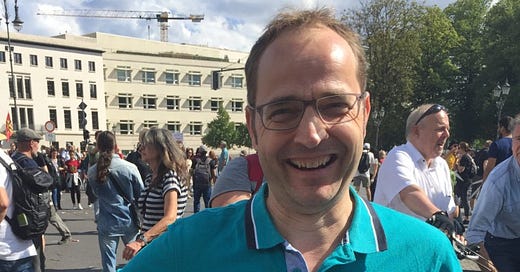Dear readers,
Today: an alternative reading of the Covid pandemic; remembering “Germany’s first far-right terror since the war”; plus weekend reading recommendations.
Do you have feedback? email us at info@hochhaus.news
Have a great Sunday,
Jörg & Axel
Laut, lauter… Lauterbach!

A study by the university of Passau found that Germany’s public broadcasters tended towards alarmism and bias in their reporting on COVID-19.
Since the start of this newsletter, Jörg has written several thoughtful pieces and told some alternative stories of Germany in the midst of the pandemic.
Comparing COVID to the flu epidemic of 2018: “Looking back at how the Grippewelle (flu wave) of early 2018 was treated by politicians and the media, it is hard not to be struck by the dramatic difference in tone.”
Beyond the storming of the Reichstag - talking to the real people at the Corona demos: “The message: the vaccine isn’t out there man, it’s in every one of us!”
The paradox of obligatory masks at demonstrations: “The one has nothing to do with the other,” they assured me. “Wearing a mask in public is not covering the face per se.”
The SPDs famous epidemiologist-cum-politician Karl Lauterbach is off mark: “[Angela Spelsberg] says that her ex-husband spends too much time sitting on TV studio sofas to have a proper grasp of the facts.”
This Friday we reported that while coronavirus cases are rising dramatically, mortality is much lower than in the spring.
The death toll has been going up in recent days, it is now on a par with average daily traffic casualties.
Blind in the right eye

This Wednesday we reported on the seemingly new threat of far-right violence in Germany.
But German papers yesterday commemorated the 40th anniversary of what was dubbed the ‘first act of far-right terror’ since the second world war. Gundolf Köhler’s bomb, planted at the entrance to Oktoberfest, killed 12 people and severely wounded 200 more.
As both the F.A.Z. and die Zeit point out, Köhler was not the first right-wing terrorist. Nor did he act alone, as investigators hastily concluded at the time. Both newspapers acknowledge that right-wing terrorism has been more prevalent and organized in post-war Germany than politicians, judiciary and the media have wanted to admit. It dates back to at least the 1960s.
Due to the recurring problem of far-right tendencies in the armed forces (something we’ve also reported on), Christof Gramm, head of the Military Counterintelligence Service, was sacked this Thursday. Mr. Gramm’s agency failed in its one job - to root out (right-wing) extremism in the Bundeswehr.
In an editorial piece, der Spiegel has blamed state interior ministers for failing to stop similar tendencies spreading inside the police forces.
Sunday reading:
Last week we wrote about how a tiny arms manufacturer trumped giant Heckler & Koch to a €250 million deal to supply the Bundeswehr. Die Süddeutsche has a great read (in German) about the small town of Suhl where the army’s new supplier is based.
“It’s totally legal and totally immoral” - The Economist on Rocket Internet’s delisting from the stock exchange (in English).
The Millions Who Left - an interactive piece (in English) by die Zeit on the East-West demographic exodus since Germany’s reunification 30 years ago.
Next week…
The story of why a spring day in Potsdam in 1933 could define the fate of the most powerful family in German history… for a second time.
“Since 2005, little girls can decide: Do I become a hairdresser — or Chancellor?” - the words of Alice Schwarzer, Germany’s best-known feminist. But does German politics still have an equality problem? Find out next week.
If this newsletter has been forwarded to you and you wish to subscribe, click here:
Who we are:
Jörg Luyken: Journalist based in Berlin since 2014. His work has been published by German and English outlets including der Spiegel, die Welt, the Daily Telegraph and the Times. Formerly in the Middle East.
Axel Bard Bringéus: Started his career as a journalist for the leading Swedish daily Svenska Dagbladet and has spent the last decade in senior roles at Spotify and as a venture capital investor. In Berlin since 2011.




